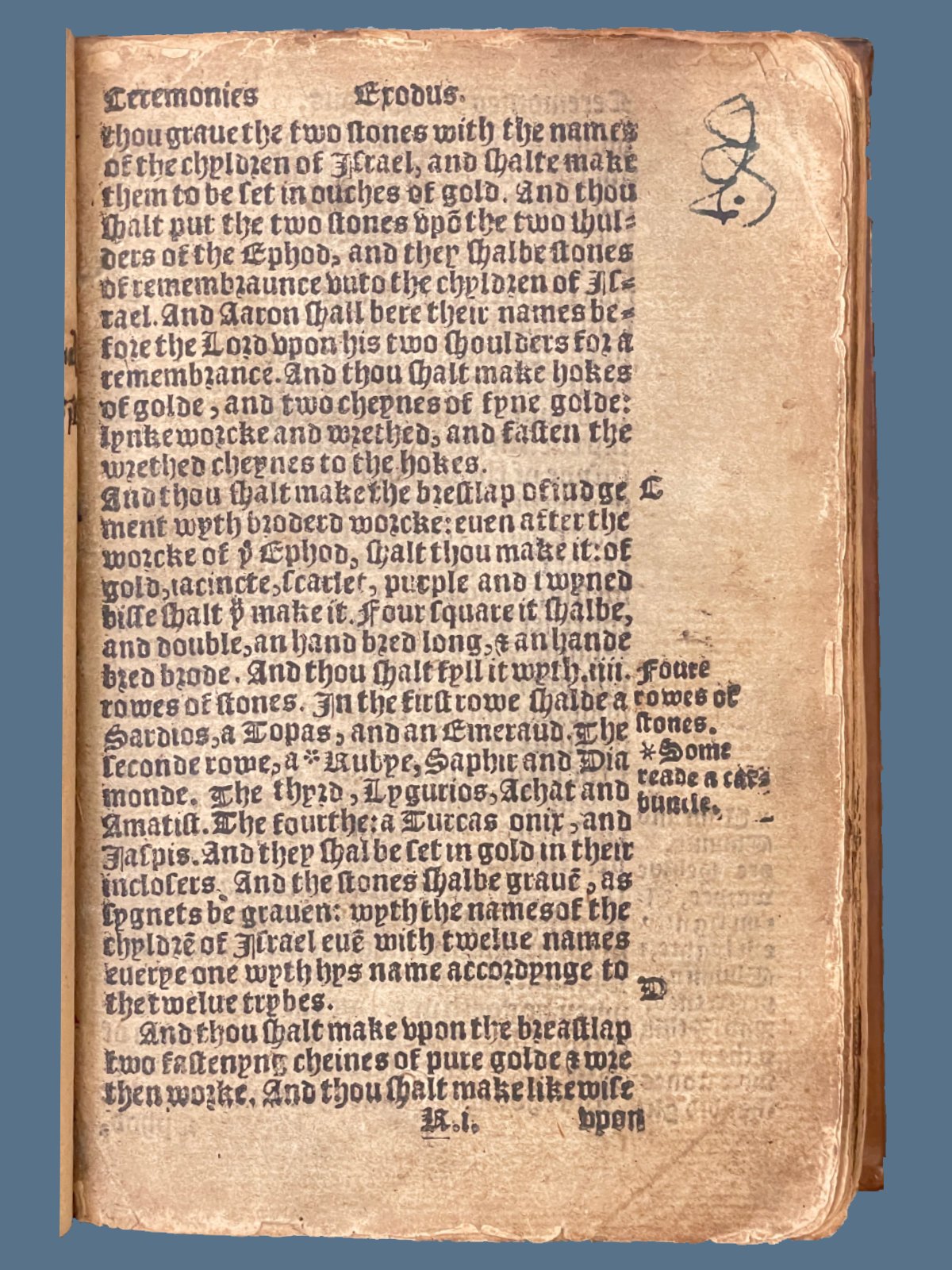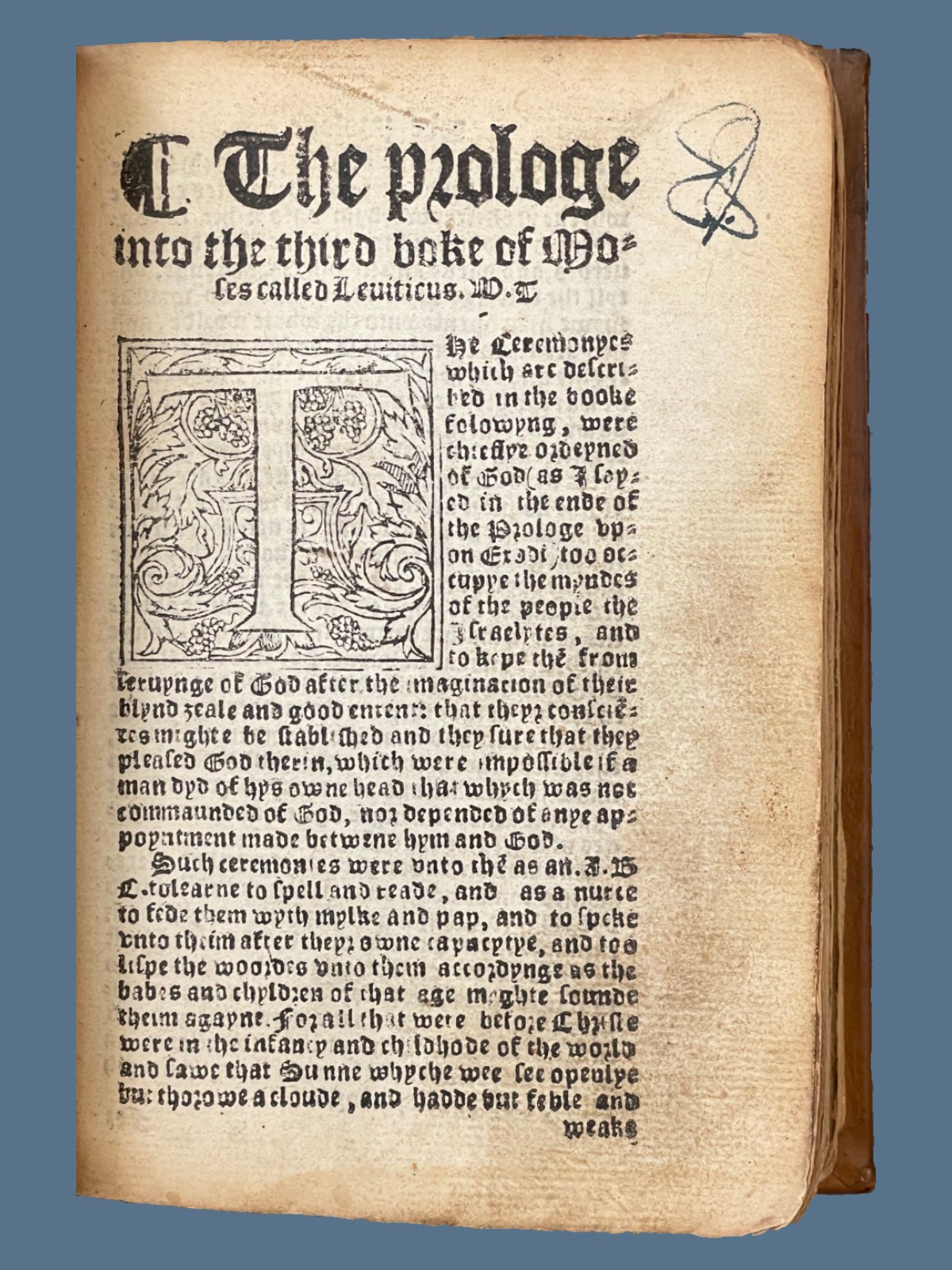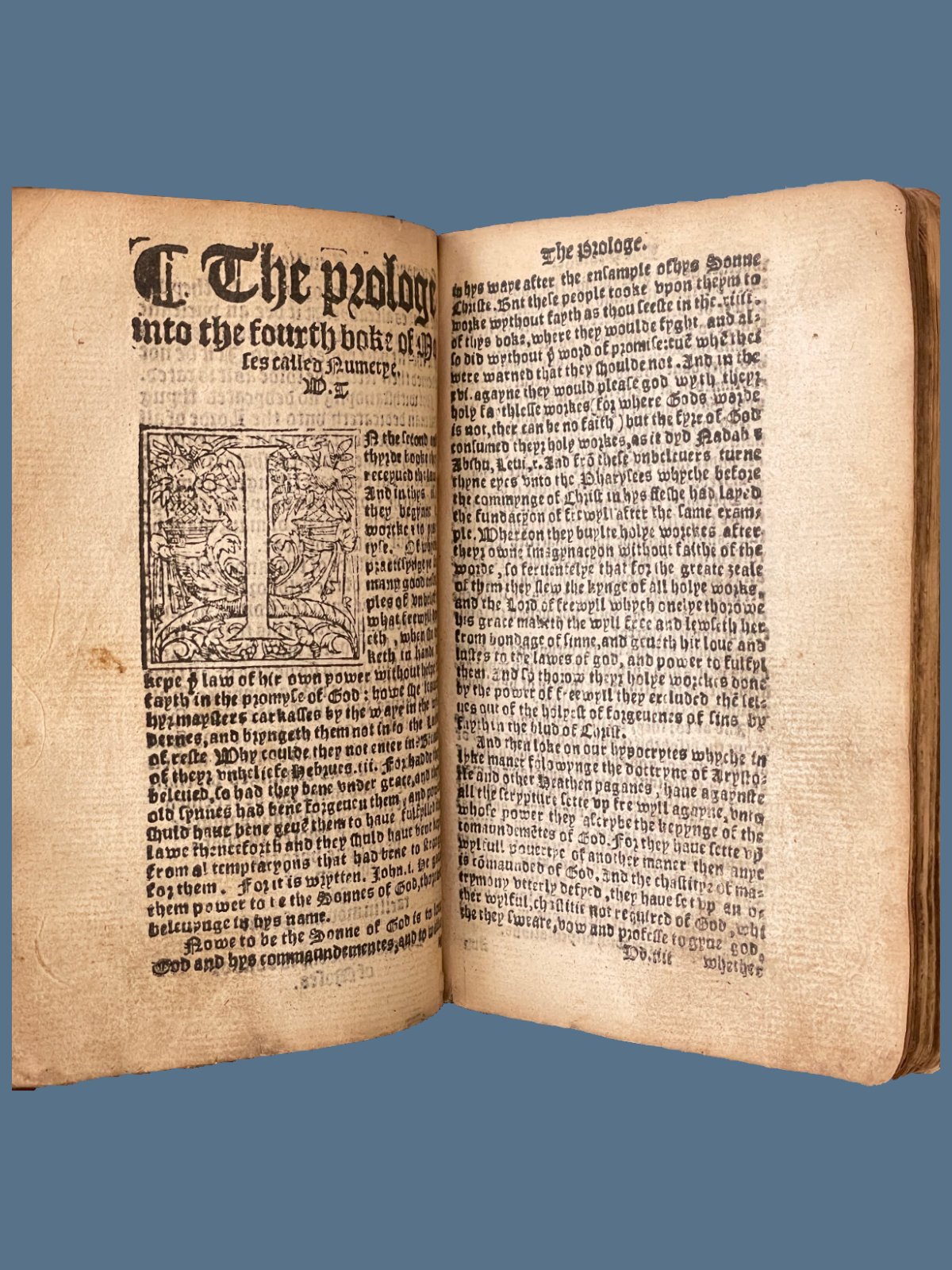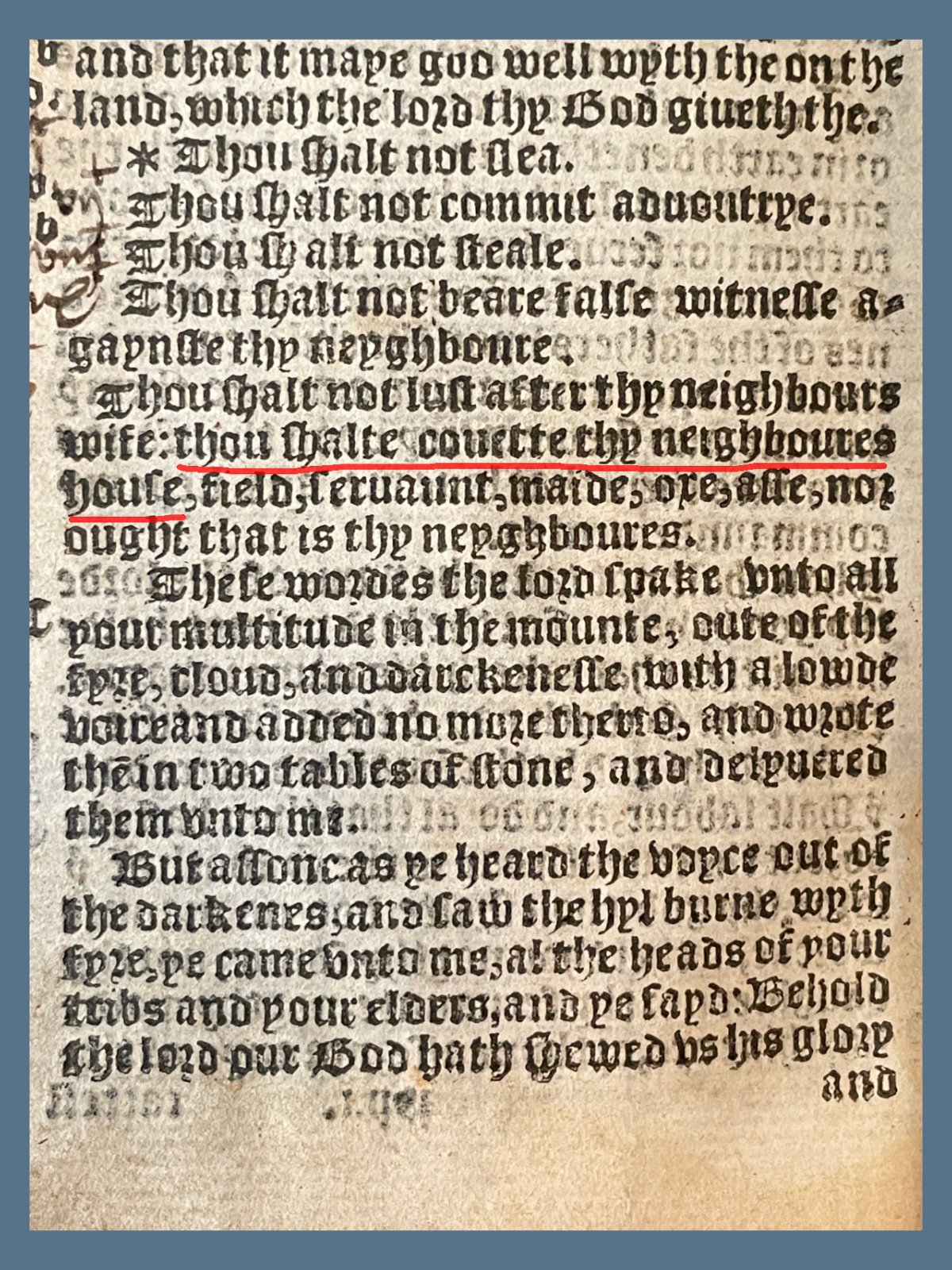1551 Tyndale’s Pentateuch with a Ten Commandments Misprint – The Only Copy in Private Hands
Key Features
The Covet Bible
Format: Octavo (approx. 5.5” x 3.75”)
Font: Single Column Black Letter
Binding: Rebound Beveled Brown Calf
Printer: [John Day, London]
SKU: R75
Key Features
The Covet Bible
Format: Octavo (approx. 5.5” x 3.75”)
Font: Single Column Black Letter
Binding: Rebound Beveled Brown Calf
Printer: [John Day, London]
SKU: R75
Key Features
The Covet Bible
Format: Octavo (approx. 5.5” x 3.75”)
Font: Single Column Black Letter
Binding: Rebound Beveled Brown Calf
Printer: [John Day, London]
SKU: R75
[The fyrste parte of the Bible called the .v. books of Moses translated by .W[illiam] T[yndale]. with all his prologes before every boke, and certeine learned notes upon many harde words. Genesis. Exodus. Leviticus. Numeri. Deuteronomium.]
Description
Text in single column black letter with woodcut initials at the beginning of the prologues and first chapters. Tyndale’s chapter summaries before each chapter, his notes after each chapter, with references and notes in the margins. A substantial fragment consisting of Ex 28:3 - Deut 28:1. The text mostly agrees with Taverner’s Bible printed in folio in 1551, which appears to be revision of Tyndale’s work on the Pentateuch in 1530. A previously uncatalogued misprint in the Ten Commandments (Deut 5:21) reads “Thou shalte covette thy neighboures house, filed, servant, maide ...” instead of “Thou shalte not covette …”.
Collation
R-Y^8, Aa-Ss^8 (Ex 28:3 – Deut 28:1). 200 out of 336 ff.
Binding
Modern beveled and paneled calf. Spine with four raised bands and two red gilt-lined morocco labels with the words “The Pentateuch” and “W. Tyndale 1530” lettered in gilt.
Condition
Twentieth century armorial bookplate on front pastedown bearing the motto ‘Taxis Kai Kosmos’ [Paul W. Schmidtchen (1914-1990)]. ‘J. Rowland Raqdale’ on front endpaper. Nine blank leaves inserted at front and rear of volume. The front leaves with two facsimile title pages laid down and one page of handwritten note discussing the rarity of Tyndale’s Pentateuch. Rear pastedown with label that reads “The Pentateuch, by Willyam Tindale. 1530. 8vo. This is the first edition, and of extraordinary rarity and value.” Attached below is a catalogue description of the Hamsworth copy of the second edition of Tyndale’s Pentateuch. Scattered staining; Y1 upper marginal repair; soiling throughout but mostly to margins and first few and final leaves.
Scarcity
We can trace no copies at auction in the last 120 years. Only two copies in holdings (British Library and Cambridge University). We’d like to thank Dr. Liam Sims at Cambridge and Aimee Burnett at the British Library for their assistance.
Note
Tyndale’s Pentateuch is one of the great rarities of the English Bible. When reflecting on the triumphs of the Tudor age, we celebrate the reigns of Henry VIII and Elizabeth I, the brilliance of playwrights and poets, and the achievements of painters, musicians, and architects. Yet, as Dr. Daniell observed, we have long overlooked a great literary achievement - Tyndale’s translation of the Pentateuch.
Tyndale’s work laid the foundation for all subsequent English Bible translations. His influence on the Old Testament is profound. Even in books Tyndale did not personally translate, his phrasing, structure, and stylistic choices shaped the future of English Bible translation. Between 1526 and 1534, Tyndale shifted from his New Testament translation to Hebrew scholarship. The first result of this effort was his 1530 Pentateuch - a groundbreaking moment in the history of the English Bible.
The five books of Moses, translated by William Tyndale, were not only the first printed editions in English—they were the first translations directly from Hebrew into English. Before this, English translations of the Old Testament relied on Latin versions rather than the original Hebrew.
In 1530, knowledge of Hebrew in England was limited to a small circle of scholars at Cambridge and Oxford. For most of the population, that there was a Hebrew language at all, or that it was the language of the Old Testament, would have been entirely unknown.
Tyndale’s translation choices show an understanding of Hebrew idioms and structure that was groundbreaking for his time. He did not merely translate word for word but sought to capture the meaning and flow of the original Hebrew in natural, readable English.
The 1530 first edition of Tyndale’s Pentateuch is known in only ten institutional copies, with a copy selling for $672,500 at the 2016 Ryrie sale. The 1534 second edition has just thirteen surviving institutional copies, with a copy at a 2013 Sotheby’s auction fetching $305,000. These are the only two copies of Tyndale’s Pentateuch ever to appear at auction.
You can imagine our excitement at the prospect of acquiring such a volume. This copy includes Tyndale’s prologues, his chapter summaries, and a title page (lacking from our copy) identifying it as “The Books of Moses translated by W[illiam] T[yndale].” Printed in octavo format, just like Tyndale’s first and second editions, it is even cataloged by institutions as "Tyndale’s Pentateuch." So, what is it? It’s a book so rare, only three copies are known to exist — one at the British Library, one at Cambridge, and now, the only obtainable copy in the world.
This is a 1551 printing of the Pentateuch, revised by Richard Taverner, and it contains an unrecorded misprint in the Ten Commandments. You may have heard of the infamous "Wicked Bible," but today, we introduce you to the "Covet Bible."
In a startling misprint, the Tenth Commandment in our copy reads: “Thou shalt covet thy neighbor’s house, field, servant, maid …” Given the extreme rarity of this edition, we reached out to the two known institutions holding copies to confirm both the misprint and the edition.
Perhaps you’re searching for a Tyndale Pentateuch, a Bible with a legendary misprint, or a book that no other private collector owns - now you can have all three at once!
References
Herbert 94; S126044; USTC 517869. D. Daniell. William Tyndale: A Biography (1994). D. Daniell. The Bible in English (2003). A special thank you to Dr. Liam Sims at Cambridge and Aimee Burnett at the British Library for their assistance.
















